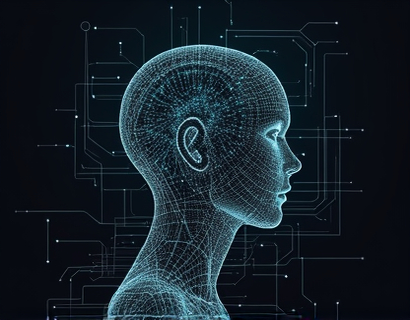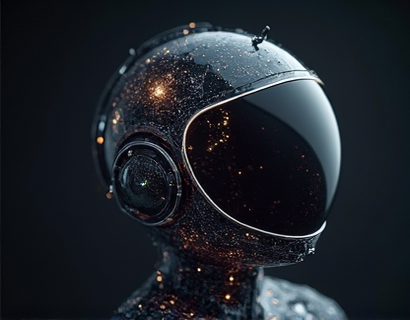Personalized AI Companions: Transforming Childhood Creativity and Emotional Well-Being Through Interactive Digital Friends
In recent years, the integration of artificial intelligence in children's play and development has opened new avenues for enhancing creativity and emotional well-being. AI-driven imaginary friends are emerging as powerful tools, offering personalized digital companions that interact with children in meaningful ways. These digital entities are not just simple games but sophisticated platforms designed to foster imaginative play, support social skills, and provide a safe space for emotional exploration.
The concept of AI companions for children is rooted in the understanding that interactive and personalized experiences can significantly impact a child's cognitive and emotional growth. Unlike traditional toys or media, AI companions can adapt to a child's unique interests, abilities, and emotional needs, creating a tailored environment that promotes learning and development. This article delves into the various ways these digital friends are transforming childhood, focusing on their role in sparking creativity and nurturing emotional health.
Enhancing Creativity Through Interactive Play
One of the most significant benefits of AI companions is their ability to enhance creativity. These digital friends engage children in imaginative play, encouraging them to think outside the box and explore new ideas. Unlike pre-defined games or activities, AI companions can generate endless scenarios and challenges, allowing children to experiment and innovate. For instance, a child might create a story with their AI friend, where the companion suggests plot twists, characters, and settings based on the child's inputs. This dynamic interaction stimulates the child's imagination and helps develop narrative skills.
Moreover, AI companions can introduce children to various creative domains such as art, music, and writing. An AI companion might suggest drawing a picture of a fantastical creature or composing a song about an adventure. These activities not only foster creativity but also help children discover their passions and talents. The AI's role is to guide and inspire, rather than dictate, ensuring that the child remains the primary creator and decision-maker.
Supporting Social Skills Development
Social skills are crucial for a child's overall development, and AI companions can play a vital role in this area. These digital friends can simulate social interactions, helping children practice and refine their communication skills. For example, an AI companion might engage in role-playing scenarios where the child takes on different social roles, such as a teacher, a friend, or a family member. Through these interactions, children learn to express themselves clearly, listen actively, and respond appropriately to others.
Additionally, AI companions can assist children in understanding and managing emotions, a key component of social intelligence. By recognizing and responding to a child's emotional cues, these companions help children learn to identify and articulate their feelings. This emotional awareness is essential for building healthy relationships and navigating social situations with confidence.
Creating a Safe Space for Emotional Exploration
The emotional journey of childhood is complex and often challenging. AI companions provide a safe and nurturing environment where children can explore their emotions without fear of judgment. These digital friends are designed to be empathetic and understanding, offering a listening ear and supportive guidance. Children can share their thoughts and feelings with their AI companion, who can respond with comforting words or suggest healthy coping mechanisms.
One of the unique aspects of AI companions is their ability to remain consistent and available 24/7. Unlike human caregivers who may have limited time or be distracted, an AI companion can provide continuous support. This consistency is particularly beneficial for children who may struggle with anxiety or depression, as it offers a reliable source of comfort and reassurance. The AI can also track a child's emotional patterns over time, providing valuable insights for parents and guardians to address any concerns proactively.
Personalization and Adaptability
The true power of AI companions lies in their ability to personalize the experience for each child. Through machine learning algorithms, these companions analyze a child's preferences, behaviors, and emotional responses to tailor their interactions accordingly. For instance, if a child shows a keen interest in dinosaurs, the AI might incorporate dinosaur-related themes into its play and conversations. This level of personalization ensures that the interactions remain engaging and relevant, keeping the child motivated and interested.
Adaptability is another crucial feature. As children grow and their needs change, AI companions can evolve to meet these new challenges. Whether a child is going through a phase of shyness or experiencing a surge in curiosity, the AI can adjust its approach to provide the most beneficial support. This flexibility makes AI companions a versatile tool for supporting children's development at every stage.
Parental Involvement and Guidance
While AI companions offer numerous benefits, it is essential to recognize the role of parents and guardians in this process. These digital friends are not meant to replace human interaction but to complement and enhance it. Parents can use the insights provided by the AI to better understand their child's development and emotional state. For example, an AI companion might generate a report highlighting a child's emotional trends and suggest activities to address any identified issues.
Moreover, parents can participate in the interactive experiences alongside their children, fostering a stronger bond and providing additional guidance. This shared engagement not only strengthens the parent-child relationship but also ensures that the child's digital interactions are balanced with real-world experiences. By working together, parents and AI companions can create a holistic and supportive environment for the child's growth.
Challenges and Considerations
Despite the numerous advantages, the integration of AI companions in childhood development is not without challenges. One primary concern is the potential for over-reliance on digital interactions, which could limit face-to-face social experiences. To mitigate this, it is crucial to establish guidelines for balanced use, ensuring that AI companions complement rather than replace traditional play and socialization.
Privacy and data security are also critical considerations. AI companions collect and analyze sensitive information about children, making it imperative for developers to implement robust security measures and comply with relevant regulations. Transparency in data usage and parental control over the AI's functions are essential to building trust and ensuring the safety of young users.
Future Prospects
The future of AI companions in childhood development is promising, with ongoing advancements in AI technology poised to enhance their capabilities further. As natural language processing and emotional intelligence improve, AI companions will become even more adept at understanding and responding to children's needs. The integration of augmented reality and virtual reality could also open new dimensions for interactive play, making the digital experiences even more immersive and engaging.
Moreover, the potential for AI companions to support children with special needs is significant. These digital friends can be tailored to meet the specific requirements of children with autism, ADHD, or other conditions, providing personalized support and therapy. By leveraging AI's adaptability, these companions can offer tailored interventions that traditional methods may not be able to provide.
In conclusion, AI companions are revolutionizing childhood development by providing personalized digital companions that spark creativity and emotional growth. Through interactive play, social skills development, and a safe space for emotional exploration, these digital friends are shaping the way children learn and grow. As technology continues to advance, the role of AI companions in childhood will only become more prominent, offering new opportunities for enhancing the lives of young individuals.











































